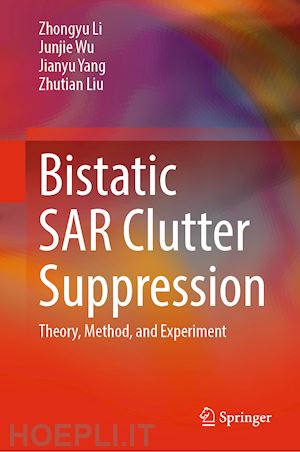
Questo prodotto usufruisce delle SPEDIZIONI GRATIS
selezionando l'opzione Corriere Veloce in fase di ordine.
Pagabile anche con Carta della cultura giovani e del merito, 18App Bonus Cultura e Carta del Docente
2. Basic Theory for Clutter Suppression
3. Signal Model of Bistatc SAR Clutter4. DPCA-Based Clutter Suppression Method
5. Optimization-Based Clutter Suppression Method6. Sparse-Recovery-Based Clutter Suppression Method
7. Experiment Technique Existing Challenges and Future Work
Zhongyu Li is the winner of the Outstanding Doctoral Society Award of the Chinese Institute of Electronics, and he was successfully selected for the China Postdoctoral Innovative Talent Support Program. He received the B.S. and Ph.D. degrees in Electronic Engineering from the University of Electronic Science and Technology of China (UESTC), Chengdu, China, in 2011 and 2017, respectively. From 2015 to 2016, he was a visiting Ph.D. student with the Department of Information Engineering, Electronics and Telecommunications, Sapienza University of Rome, Rome, Italy. He is currently an associate professor with UESTC. His research interests include synthetic aperture radar technology (particular emphasis on bistatic/multi-static SAR moving target detection and imaging technologies).
Junjie Wu is the winner of the Outstanding Youth Fund of the National Natural Science Foundation of China. He received the B.S., M.S., and Ph.D. degrees in electronic engineering from the University of Electronic Science and Technology of China, Chengdu, China, in 2004, 2007, and 2013, respectively. He is currently a professor with the UESTC, Chengdu. From January 2012 to January 2013, he was a visiting student with the Department of Electrical and Computer Engineering, Duke University, USA. His research interests include synthetic aperture radar imaging (particular emphasis on bistatic synthetic aperture radar).
Jianyu Yang is a fellow of the Chinese Institute of Electronics. He received the B.S. degree in electronic engineering from the National University of Defense Technology, Changsha, China, in 1984 and the M.S. and Ph.D. degrees in electronic engineering from the University of Electronic Science and Technology of China (UESTC), Chengdu, China, in 1987 and 1991, respectively. He is currently a professor with the School of Information and Communication Engineering, UESTC. His research interests are mainly in synthetic aperture radar (SAR) and statistical signal processing.
Zhutian Liu: Zhutian Liu received the B.S. degree in electronic engineering from the University of Electronic Science and Technology of China (UESTC), Chengdu, China, in 2015, where he is pursuing the Ph.D. degree with the School of Information and Communication Engineering. His research interests include synthetic aperture radar clutter suppression and ground moving target detection.











Il sito utilizza cookie ed altri strumenti di tracciamento che raccolgono informazioni dal dispositivo dell’utente. Oltre ai cookie tecnici ed analitici aggregati, strettamente necessari per il funzionamento di questo sito web, previo consenso dell’utente possono essere installati cookie di profilazione e marketing e cookie dei social media. Cliccando su “Accetto tutti i cookie” saranno attivate tutte le categorie di cookie. Per accettare solo deterninate categorie di cookie, cliccare invece su “Impostazioni cookie”. Chiudendo il banner o continuando a navigare saranno installati solo cookie tecnici. Per maggiori dettagli, consultare la Cookie Policy.